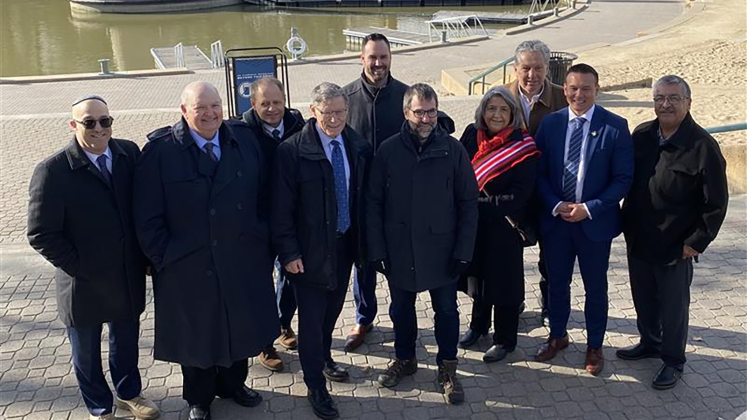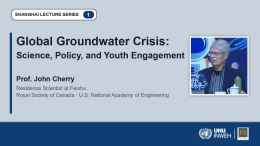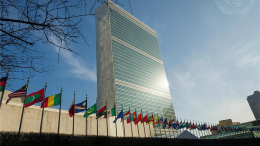A new milestone
The formal creation of the Canada Water Agency (CWA) on 16 October 2024 marks an important and historic milestone for this water-rich nation. It enables Canada to substantially advance understanding and managing one of its most precious resources – water. Working across Canada with key partners and stakeholders, including the provinces and territories, Indigenous communities, local authorities, academia, industry, and water-related non-governmental organizations, the vision of the CWA is to effectively advance the capabilities across regions, sectors, and institutions to address water-related challenges in a manner that is integrated, inclusive, adaptive, and forward-thinking.
The CWA is set to tackle Canada’s largest water management challenge – the sometimes-disconnected nature of governance. Water issues cross political, geographical, and institutional boundaries, yet the responsibilities for water management and the access to data to inform decision-making are fragmented. With water management responsibilities and related water data systems dispersed across governmental agencies, monitoring and research organizations and regions, it has historically been difficult to synergistically respond to cross-sectoral water problems in Canada.
By building cooperative relationships between different levels of government, community-based organizations, the private sector, and academia, CWA’s leadership will ensure that Canadians have access to data and information they need to improve water sustainability and reduce the impacts of water-related hazards. In particular, the proposed role for the CWA to lead the development and implementation of a comprehensive National Freshwater Data Strategy will lay the foundation for substantial improvements in the discoverability, accessibility, and usability of freshwater data in Canada. Building on the principles of trust and respect, communication and collaboration, the CWA will help ensure that Canadians have access to the data they need to inform decisions on safe, clean and well-managed freshwater.
The challenges in managing water are increasing markedly as climate change progresses, as cities get larger, and as the economy grows. The complexity of these water-stressors necessarily means that the intelligence that is required to address Canada’s wicked water problems is scattered across government departments, communities, companies, and universities. Addressing this complexity requires unifying contributions across multiple fields of study, including key contributions from groups that may not normally be involved solving water crises – i.e., not just hydrologists and water resource engineers, but also biologists, ecologists, geologists, geochemists, social scientists, atmospheric scientists, economists, computer scientists, and applied mathematicians, among others.
The promise of the CWA
It is within this context that the formation of the new water agency holds promise, especially in fostering the kind of multi-level coordination and collaboration that is so desperately needed. The CWA aims to understand and promote constructive dialogue on freshwater issues and data management needs of First Nations, Inuit, and Métis communities across Canada. These efforts will be essential for building strong relationships, honoring agreements, and respecting Indigenous rights, interests, knowledge, and cultures, including recognizing the need for data-sharing protocols that protect Indigenous science and Indigenous Knowledge Systems while enabling collaboration. Importantly, this will help ensure Indigenous peoples have a substantive, meaningful and respectful role in the co-development, implementation and delivery of water program activities.
Given this as background, CWA’s success requires building and nurturing a community of practice that focuses efforts across academia, the private sector, community organizations, Indigenous peoples, and government on the critical water crises of the century. Whilst Canada is rapidly accumulating the knowledge, expertise, and models that can predict changes in its terrestrial and aquatic systems, it is now very clear that the contributions from different research and operational groups are insufficient on their own. CWA’s role in developing a community of practice provides the “all-hands-on-deck” approach that enables developing solutions that increase resilience to water-related threats.
This coordination will need to occur in lockstep with targeted investments. Since much of the intelligence that is needed to manage water resources still needs to be developed, targeted investments are essential to acquire the necessary monitoring and research data on environmental change, to improve understanding of terrestrial and aquatic water systems, to develop technical solutions –and, importantly – to provide a synthesis of existing information and knowledge, and to translate information and knowledge in ways that are useful to define solutions. Investments will also be necessary to ensure the participation of Indigenous peoples from across Canada. In carefully targeting its investments, CWA can effectively develop the scientific understanding and the capacity for prediction, evaluation and reporting that enables Canada to select effective solutions to mitigate and adapt to the critical water crises of the current century.
Public engagement will also be a crucial component of the new agency’s work. Water-related impacts are a significant public concern, yet they are often overlooked, with public perception often focused on other societal issues such as healthcare and the economy. However, public support is essential for successful adaptation efforts. The new agency will need to work closely with communities to build awareness of the importance of water management and climate adaptation, framing solutions in terms of co-benefits that improve quality of life and protect personal safety. By taking advantage of moments of heightened public awareness—such as during extreme weather events—the agency can mobilize support for proactive water management measures.
Looking forward
The establishment of this new agency represents an important step forward for Canada in managing its water resources amidst the growing challenges posed by increasing threats to surface and groundwater availability and quality from climate change and other environmental stressors. By positioning itself as a boundary organization, CWA can play a critical role in bridging gaps between science, policy, and practice, fostering adaptive governance approaches, and promoting cross-boundary collaboration. Water is a shared resource, and its effective management requires an integrated and collaborative approach that recognizes the complexity of natural systems, cultural and societal needs, and governance structures. As this new agency begins its work, it has the potential to set a new standard for water management in Canada, ensuring that the country’s water systems remain resilient, equitable, and sustainable in the face of an uncertain future.
In addition to being one of the countries with the highest freshwater resources and being home to the most lakes in the world, Canada has a special standing when it comes to water action-oriented research and education. Since 1996, Canada has been the host of the United Nations University Institute for Water, Environment, and Health (UNU-INWEH)—the UN Think Tank on Water. As of 2023, Canada is also the host the world’s first UNU Hub—the UNU Hub on Empowering Communities to Adapt to Environmental Change at the University of Calgary, one of the nation’s top academic institutions with growing water-related transdisciplinary research and education programs. These entities look forward to working with the CWA in addressing Canada’s water issues and setting a successful example of bridging water science and policy for the world.
Authors:
Martyn Clark1, Marjan Eggermont1, Alain Pietroniro1, Fred Wrona1, Kerry Black1, Kaveh Madani2
1The United Nations University Hub on Empowering Communities to Adapt to Environmental Change, University of Calgary, Alberta, Canada
2The United Nations University Institute for Water, Environment, and Health, Richmond Hill, Ontario, Canada
Suggested citation: Martyn Clark, Marjan Eggermont, Alain Pietroniro, Fred Wrona, Kerry Black and Kaveh Madani. "The Canada Water Agency: The dawn of a new era for cooperative water management," United Nations University, UNU-INWEH, 2024-10-29, https://unu.edu/inweh/article/canada-water-agency-dawn-new-era-cooperative-water-management.




